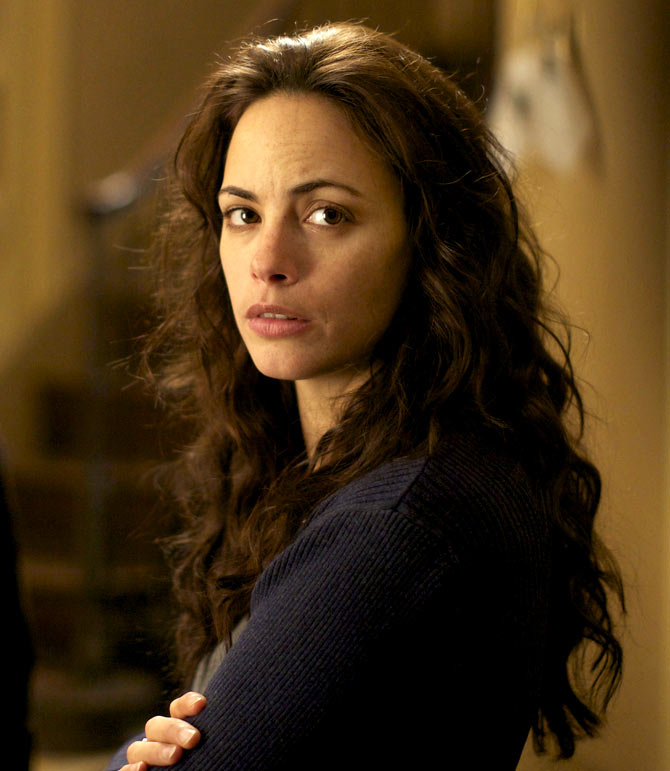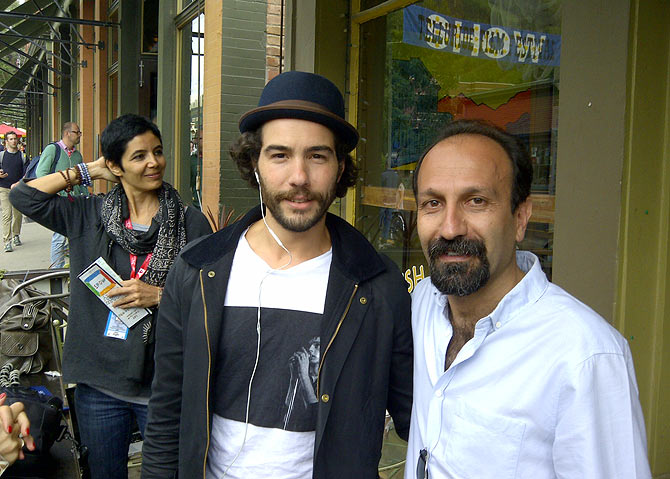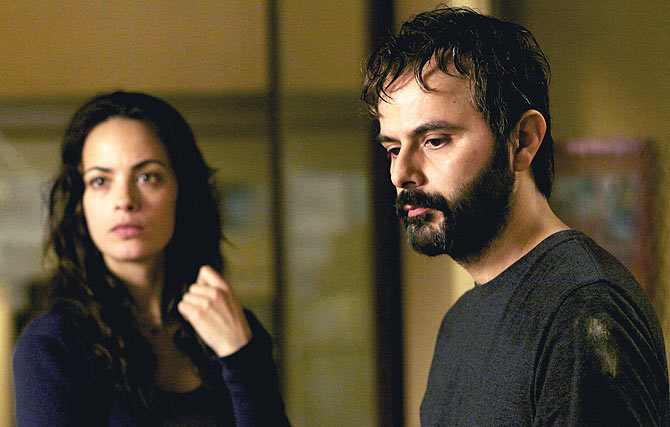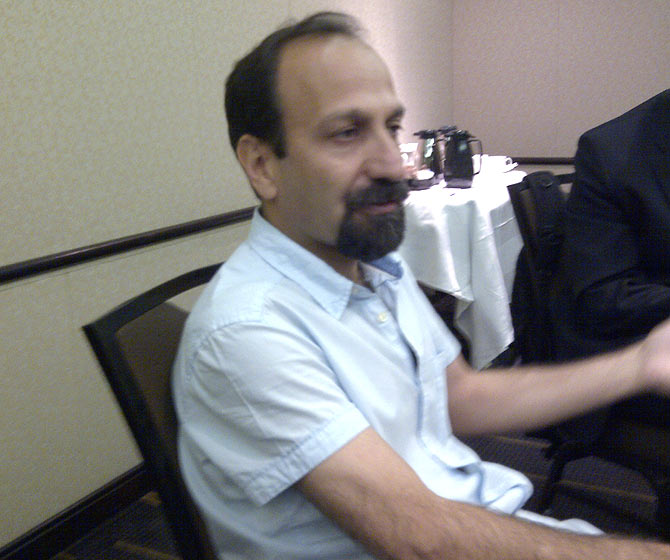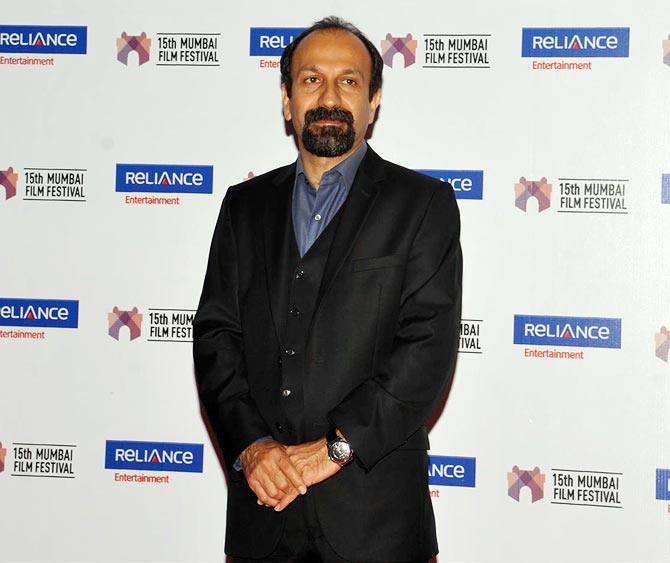 | « Back to article | Print this article |
Oscar winner: Iranians are familiar with Bollywood
Asghar Farhadi won the Oscar for the Best Foreign Film in 2012. The Iranian director, one of the finest filmmakers in the world today, speaks to Rediff.com in an exclusive interview.
Asghar Farhadi entered the world film arena in a big way with his 2009 film About Elly that won him a Silver Bear for best director at the Berlin Film Festival.
That film -- a group of friends on a weekend trip to a beach house in Iran, and the sense of guilt they feel as one of them goes missing -- set the tone for his future social dramas.
Two years later, he was back with what could be the most important work of his career -- the Oscar winning A Separation (the first Oscar win for an Iranian filmmaker), a heartbreaking complex layered story that dealt with class and religious structures in contemporary Iran.
A Separation (previously known as Nadir and Simin: A Separation) won Farhadi major support among the international film community and a fan following among those who watch foreign films.
The success of the film must have been a great boost for Farhadi, for he is now back with a bang with an equally strong and emotionally devastating drama, The Past.
In the film, an Iranian man returns to Paris after four years to finalise his divorce with his French wife (a wonderful Berenice Bejo, who won the best actress award at Cannes).
There, he meets her French Arab boyfriend (Tahar Rahim of A Prophet) and re-unites with her young daughters from an earlier marriage.
The Past is a story about people who cannot wipe off their history and so are unable to move forward.
Farhadi is in Mumbai this week, where he heads the India Gold section jury at the Mumbai film festival.
Farhadi spoke to Rediff.com Contributing Columnist Aseem Chhabra about The Past and Indian films.
I am very touched by your films, how universal they make all of us. You seem to be saying that there are different cultures and lifestyles, but essentially we are the same complicated, often deeply flawed people.
I think in different cultures there are much more similarities. That's why we use differences to compare and not the similarities. That's why the differences are always highlighted.
Our lifestyles might be different, but our emotional points are the same. Love everywhere has the same feeling. I can't say that someone who falls in love in Japan would feel differently than someone who falls in love elsewhere in the world.
So I base my stories on the similarities and not on the differences. And this helped me to make my film in France.
Please click next to read more...
'I usually close my eyes and allow the story to come to me'
Why did you go to France to make The Past? Could it have been made in Iran?
I could have made this film in Iran, but then I would have changed a few things.
I didn't make the decision to go and make this film in France. This story told me that I had to go and make it there, because this is a story about a man who travels long distance from one place to another.
Had I made this film in two towns in Iran, we could not have felt this distance. And we could only justify his four-year absence because of the distance.
But you can ask me why did I chose France? I could have set it in any other country.
When the subject and the title of the film is The Past, I had to find a city that smells of the past. I couldn't have gone to Hong Kong to make this film. Paris, like Rome, is a city where the past or history is a living thing.
How did you find making the film outside Iran different from Iran? I am not talking in terms of any political censorship, but rather on a cinematic level.
I can't really tell what the difference between filmmaking in France and Iran is, because even when I was in Iran I made my films my way, not like other Iranian films.
And when I went to France, I made the film my way and not how French films are made.
I had much more facilities, much more money and everything I wanted at my disposal. But when I came to France, I didn't change as a filmmaker. I worked the same way as I worked in Iran.
You have said that your scripts are the way for you to work out your feelings and ideas about relationships between people.
I want to know what brought you to the topics that you explore in The Past, the ideas of immigration, the Diaspora, living away from your home country, grieving over a partner who is in a coma, adultery?
Usually these stories are formed in a way -- these are from the memories I hear from other people. When I am making a film I do not say, 'Okay, I am going to make a film about these specific topics.'
I usually close my eyes and allow the story to come to me. I think in all of these stories all of the themes of world exist. It depends how you tell the story. So one of these themes comes up much more.
Even the bedtime stories we tell our children have the theme of love, hatred, fear. But the way we tell our children is to highlight the particular theme that we want to tell them.
A lot of this comes from my subconscious when I am writing. The fact that I talk about the characters's relationships, that they are attached to the past comes from my subconscious.
Please click next to read more...
'I allow my actors to improvise on the sets'
Do you feel the social context comes from your subconscious too, because a lot of your films address things like religious, class?
It must be like that. The place I have grownup, the situation has given me a lot. If a filmmaker is honest with himself, the source of inspiration is the environment that he lives in.
I was very curious about how you work with children. Your daughter acted in A Separation. There are three kids in The Past, and the little boy Found (young actor Elyes Aguis) was the best of all.
When a child is that young, how do explain to him the emotional context of the scene? The questions that he asks his father at the subway station, can you tell the child every detail about what is happening in the film and the script?
When you working with adult actors, you have to tell them the truth, why this is happening. But when it comes to children, you should not tell them the truth of the story.
The image that I was building for Found of his mother was not a very likable one. I wanted him to like Marie (Bejo) more, because when he mentions that he wants his mother to die, if he actually had a connection with his real mother, he could not have been able to say that.
If I had told truth to the boy, he would have disliked the father. But I wanted him to have a good relationship with his father versus the mother. So I told him when your father leaves home, your mother is talking on the phone with a gentleman.
So he started to dislike his mother and that's why he doesn't have a good relationship with her.
But when the boy saw the film, he actually called me and said this is not about my mother, but it is my father who is cheating on her.
I am curious about your filmmaking process. It seems more than any filmmaker you have so much control over the script and it is just pitch perfect.
How much influence is there from the actors and others in your filmmaking process?
Do you ever improvise, does anything every change from the original conception of the idea?
I think what you are saying is probably an impression you get from the interviews from the actors, but it is not what happens.
What I try to do is to make them feel that they are free to do whatever they wish to do. In the rehearsals before the shooting starts, I give them this freedom to improvise.
But when the filming starts, I turn into a dictator of sorts. I have no other choice. Because the story is written in a very tight way. It is like a chain connection to each other, and if I remove one element from the other -- maybe it will not be noticeable initially, but will show up in another scene.
Please click next to read more...
'My films, in a way, are detective stories'
When I interviewed you for A Separation, you said that in each of your films -- including About Elly -- there is an element you don't show, and I think here the element is when the woman commits suicide.
How do play with that one detail and get everything around it so perfect? The audience is totally engrossed and even until the end, we do not know what the real truth is.
My films, in a way, are detective stories. But you don't see a detective in the film.
In most detective stories, an event happens which the audience have not seen. So the audience follows the detective to find out the mystery.
It is the same thing in my films. I do not show the mystery in the puzzle and there are no detectives. It is the audience who actually becomes the detective to go and find out what is happening.
This mystery in The Past is really not a very big mystery. We talk about it a lot in the film. But what makes this mystery very complex is that we get different points of view and that is what makes the situation complex.
For example, the suicide, some say she was depressed and some say no it is because of the relationship of the two characters. So we always hear different stories.
Usually we hear all these justifications from the adults because they are trying to justify their responsibilities.
In your films, you really care for your characters and so even those who we don't want to like, we still like because you give them that kind of fair treatment.
This is one of the most important things I think about and have always tried to maintain it to develop characters.
I don't want to say that everything people do is justified. But I believe that everything that my characters do, they have their own reason to do it.
And in the film, I always give them a chance to justify their acts. In my last film, something happened, which is new.
In my older films, whatever the characters did, they thought about it and then they acted on it. But something I have recently realised that so many of the things we do -- we do them and then we think about them. And this makes the situations much more complex.
In beginning of The Past, Marie asks Ahmad (her Iranian husband played by Ali Mosaffa) to come to her house and not to go to the hotel, but she doesn't even know why she is asking him.
It seems as if she is unaware of what she is asking. But later when Sameer (Rahim) asks her then she realises what she has done.
Please click next to read more...
'I saw a lot of Indian films while growing up'
In your opinion, what films constitute Iranian films? You watch something like Certified Copy, you can feel Iranian elements in it.
Even in The Past and more than just because one of the character is Iranian, but because the concerns that those family members have come from an Iranian place. Do you agree?
I think the issue about the identity of a film is determined by the audience. French people watching The Past think it is a French movie, but if Iranians watches it they might think it is Iranian. And I am very happy because I realise how much similar they are culturally.
In your film Dancing in the Dust, you had shown a Bollywood song playing on the screen. Have you grown up watching Indian films?
During the Iran and Iraq war, we saw two types of films. Because we were at war, they showed many European war films on television. They were interesting films but now I realise that they were very bad for the phase we were going through.
The fact that I do not depict violence in my films is maybe a reaction to those war films.
The more we saw those violent films, the more we felt the gap and we had to see much more softer and emotional films. And that's why we went to see Indian films. That's why many Iranians are familiar with Bollywood movies.
Did those Bollywood films influence your filmmaking at all?
Not Bollywood films, but the good Indian films. I saw a lot of them after I grew up. Such as the films of Satyajit Ray.
